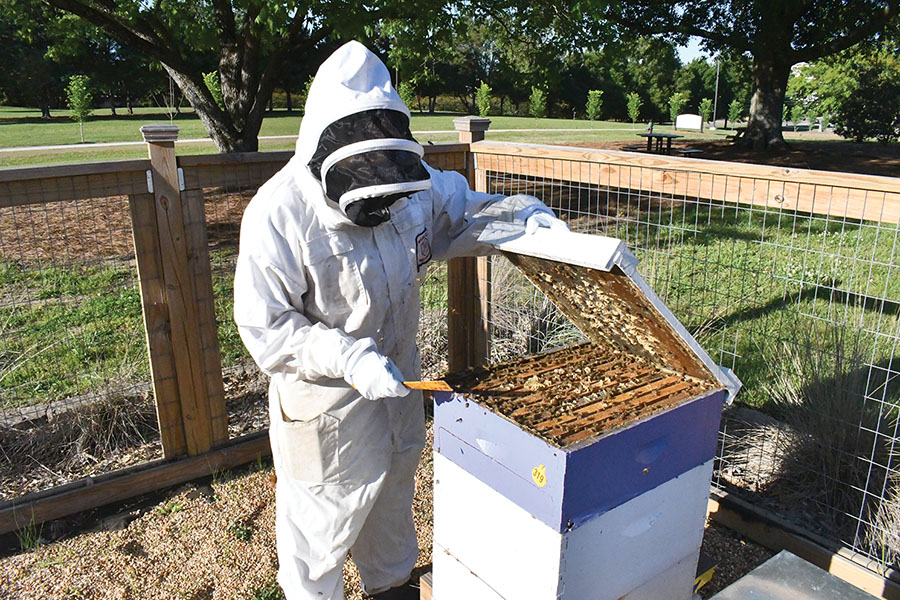When Carol Brown, a beekeeper in New Hope, plans out her yearly apiary in early spring, she tries to pay attention to what pollinator plants bloom and when.
But resources on nutrition that her bees need from various plant life aren’t as accessible as the seeds to grow those flowers.
Priya Chakrabarti Basu, assistant professor for pollinator health and apiculture at Mississippi State University, aims to fix that through a pollination database she and a team of students aim to complete later this year.
Basu said both native and honey bee populations have been in decline through the last several decades as a result of land development, non-diverse agriculture and other related factors. The database will provide a list of pollinator plants and their various nutritional values, and she hopes it will help reverse some of the adverse effects of bees losing habitat.
Basu said if bee populations were to continue being affected by loss of food source, it could have a negative impact on crop production and quality.
“If we do not have adequate healthy populations of bees, both managed as well as native bees, that will definitely impact crop pollination,” Basu said. “For example, a lot of recent research and evidence suggests that certain fruit yield as well as fruit size, the quality of the fruit itself, improves when pollinators are present.”
As an industry, bees bring in a lot of money both directly and indirectly.
The pollination of crops such as berries, vegetables, cotton, soybeans, peanuts and wild plants throughout the state indirectly contributes to more than $200 million in economic value, according to an MSU Department of Agriculture and Commerce 2021 economic report. Honeybee keeping alone brings in about $3 million from the sale of bees, honey, beeswax production and pollination fees.
Basu began leading the pollinator database project in 2021, when she joined MSU’s Department of Biochemistry and Molecular Biology. So far, her team, consisting of a handful of undergraduate technicians, graduate and doctorate students, have collected more than 70 pollen samples from hundreds of wild and domestic flowers like clovers, sunflowers, daisies and others.
“We are looking at the nutritional resources that these pollen grains have,” Basu said. “Like humans, bees require macro and micronutrients. So providing them with a diversity of these nutrients is going to make sure that they have access to optimal nutrition.”
Basu has also partnered with Oregon State University and more than 50 other independent scientists to collect pollen samples and send them to MSU for further analysis. The project is funded by the United States Department of Agriculture in partnership with the university.
Once those samples are collected, they are taken to the Clay Lyle Entomology Lab on campus to study varying ratios of proteins, lipids, amino acids and carbohydrates, which native and honeybees use to make honey and beeswax for nutrition and building the hive.
Through that research, Basu found plants like clover, golden flowers, water lilies and mustard help to produce high amounts of proteins and lipids, which help honey production.
Other plants like soybeans, cotton, clematis and buttercup flowers provide micronutrients like amino acids and phytosterols, which help digest their food and process vitamins, like human cholesterol, Basu said.
“Proteins and lipids are what we call macronutrients, they are required in larger quantities, and of course they are important,” Basu said. “What this database … is also looking into is our micronutrients. They are required in smaller amounts, but they are equally important as well.”
Once the database is complete, Basu said, it will be made publicly available online.
Helping beekeepers
According to Jeff Harris, an associate professor at MSU and honey bee specialist at the university’s Extension Service, there are five commercial apiaries in the Golden Triangle, as well as about 120 hobbyist beekeepers.
Some of those beekeepers in the Golden Triangle are looking to the database as a way to manage their operations.
Brown, co-owner of Brown’s Bees in New Hope, said she and her husband, David, could use the database better to plan different types of plants throughout the year to provide a balanced diet to their more than 120 hives.
“That way we would know what to plant and where to place our bees,” Brown said. “If we could find a crop that was growing that was really nutritious, we could put some bees there to get some nectar and pollen from that.”
Harry Fulton, owner of BigBee Valley Apiaries, a commercial apiary in Noxubee County, said while lists about pollinator plants exist, he thinks that this new one could provide research for pollen substitutes, which are used during periods of staggered bloom when there isn’t much variety for honeybees to eat, such as mid-summer when cotton blossoms.
“The cotton pollen is not very nutritious for the bees during bloom and they are suffering from lack of nutrition,” he said.
Lauren Jennings, a graduate student in the project, said beyond helping businesses, the research provides an opportunity to maintain bee populations by having more pollinator species available.
“This is going to be the first database of its kind in North America,” Jennings said.
You can help your community
Quality, in-depth journalism is essential to a healthy community. The Dispatch brings you the most complete reporting and insightful commentary in the Golden Triangle, but we need your help to continue our efforts. In the past week, our reporters have posted 36 articles to cdispatch.com. Please consider subscribing to our website for only $2.30 per week to help support local journalism and our community.







